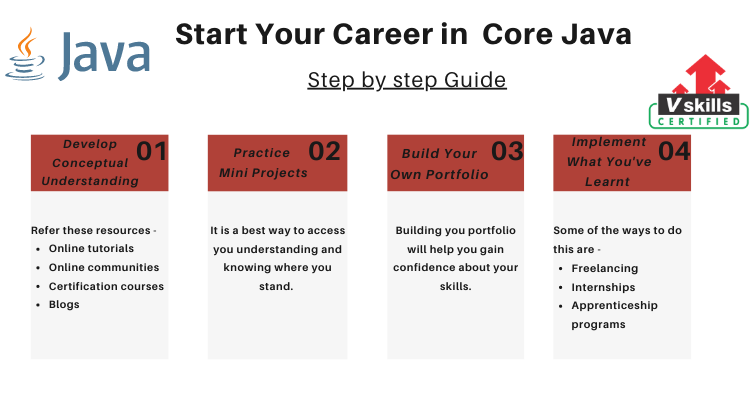Oracle Corporation stated that by 2006 more than 30,000 organizations, along with more than 35 of the 5th largest companies in the world, had become consumers of Fusion Middleware. IBM also uses Java as the other big player. Microsoft is responsible for the rest of the industry. So Java Program makers are in enormous demand across the world.
Let us now look at the career prospects of Core Java.
What is core Java?
It is a general term for the standard version of Java used by Sun Microsystems (JSE). It is the most basic version of Java that lays the basis for all other Java editions plus a number of related technologies such as CORBA, Java VM, etc. Core Java is not just the programming language but a library collection. It is the purest way of using Java primarily for generic desktop applications development.
Reasons to learn Java
Couple of reasons for which you should learn Java are –
- Java is one of the world’s most famous languages. According to Oracle blogs, it is used in about 9 million developers worldwide and runs on about 7 billion devices. Java’s developers are also very wanted because of the strong demand for Java and they hold some of the industry’s highest paid jobs. A Java Developer’s average salary is between $47,169 per year and $106,610.
- There is a large online community of Java users from beginners to advanced levels, including experts, which are particularly beneficial if there is a need for support. Online communities are StackOverflow, Java Forums and so on for learning purposes.
- Java has an abundant API that contains many Java classes, packs, interfaces, and so on. This is helpful for building applications without understanding their internal implementations. Java has primarily three types of APIs, i.e. Java Core APIs, Java APIs, and Official Java APIs. The total use of these APIs is almost all like networking, I/O, database, media, XML parsing, speech synthesis, etc.
Career opportunities
The job roles in Java differ from one organization to another, going from portable improvement to web application advancement. Here, are the couple of occupation that you can consider after you have gained sufficient knowledge about Java:
1. DevOps Engineer
For seasoned developers, this is another new opportunity. No formal career track is available to become a DevOps engineer.
Either developer who is involved in network operations or implementation, or sysadmins who are passionate about scripting and coding, step into the development side to enhance test and deployment planning. That means that you can become a DevOps engineer if you are a seasoned Java programmer with a passion for environmental management, automation and structure improvement.
2. Solution Architect
One solution architect is responsible for the design and is usually part of a solution developing Team for one or more software or services within the company. The task of the solution architect is to translate and describe the requirements created by functional analysts through architecture and design artefacts into the architecture for this solution.
You should have a clear grasp of basic principles such as data structure and algorithms as well as system design and design trends in order to be a professional solution architect. To select the right one for the job, you should also be aware of many programming languages and technology stacks such as Java, Net and another.
3. Scrum Master
You’ve certainly learned about Scrum meetings and Scrum Master when you’ve worked in an Agile setting. The task of Scrum Master is to hold regular Scrum meeting and to fix any blocker. It needs some project management skills and topics, along with some teamwork skills.
4. Business Analyst
The analyst participates in the creation or amendment of enterprise systems or IT systems. To understand their problems and needs, the analyst communicates with corporate actors and subject matter experts.
The Market Analyst collects documents and analyses business needs. I suggest you look at Business Analysis Fundamentals, an excellent course on the subject, if you’re new to the Business Analysis and wonder about your position.
5. Project Manager
The project manager is responsible for daily project management and must be competent to handle the six project aspects, such as scope, schedule, financing, risk, quality and resources. As your project manager, you are responsible for planning, budgeting, supervising and documenting all aspects of your project. Project managers should work with upper management in close cooperation. I recommend you start with the Beginning Project Management Level One, one of the best courses to learn the fundamentals of project management, if you’re new to project management and struggle to monitor your project.
How can you start your career in Core Java?
It is very much important to have a decent beginning with proper assets and learning material to be acceptable at something. Therefore, you initial steps towards learning must be apt in order to be pro in this field. Let look at some steps that you can take in order to begin your learning process –
Step 1 – Learn about the basics and Develop Conceptual understanding
Before becoming an expert in some field, it is very much essential that you have a strong base. An appropriate applied information is required even before you get your hands on to the pragmatic labs. Everyone starts somewhere. You need to take baby steps if you want to build a successful career in this field. You can take the help of following resources for getting complete knowledge and having a complete conceptual understanding –
- Firstly, Online Tutorials for Core Java
- Also, Certification Courses from verified sources such as Vskills, Coursera, Udemy and so on.
- In addition, Online communities
- Moreover, Blogs and study material from experts in this field and many more.
Vskills also provide Online tutorials, certification courses and free practice tests for the same. You can check them out on our official site.
Step 2 – Practice Mini Projects
Practicing is crucial if you want to land in a good place. Also, it is a best way to access you understanding and knowing where you stand in terms of implementing the knowledge you have gained. When it comes to the practical aspects like implementing Core concepts in projects, having some experience can help you outshine others. You can supplement your learning with the help of reading the blogs and tutorials by various sites which will help you to grasp a better understanding of the practical aspect.
Step 3 – Build Your Portfolio
Building you portfolio will help you gain confidence about your skills and will also get you a platform to implement your learnings. Your portfolio shows your abilities to carry out and plan various codes or how impeccably you execute your abilities in Core Java. These tasks ought to incorporate a few diverse datasets and should leave readers with intriguing bits of knowledge that you’ve gathered. Your portfolio needn’t bother with a specific subject; find codes that interest you, at that point think of an approach to assemble them.
Step 4 – Implement your skills in Real world
Implementation of the skill you have gained is very much important because that is why you have been learning for – To be able to implement the skill perfectly! It is also important to keep updating yourself with new technological advancements and keep working and developing on your own skills. You can also enroll in some of the advance learning courses which will also serve as proof that you are well aware of advanced skills. Some of the ways through which you can implement your skills are –
- Freelancing
- Internships
- Apprenticeship programs
Above mentioned steps will help you to get started in this domain. However, there is a long way to go. You can take up an advanced course to take your skills to a new level.
Market Demand
One of the reasons Java is so popular and the number of open jobs for Java coders staying consistently high is the fact that a number of big companies rely on this programming language for the development of the backend side of their products. For example, here is a list of major tech companies whose products are more or less entirely based on Java: Uber, Airbnb, LinkedIn, eBay, Spotify, Square, Groupon, Pinterest. Google still has a high percentage of its development in Java. A number of big Indian software companies, including Infosys, TCS, Wipro, HCL Tech, Myntra, and others are big lovers of Java as well. Global tech giants, like Accenture, Intel, Symantec, Philips, Thomson, T-Mobile are heavy users of Java also.
Average Salary
Well, according to PayScale, the average salary for a Java developer in the U.S. is $74,300 per year, with an average salary range of $50k to $105k per year. Glassdoor’s numbers are even higher at $74,100 per year as an average salary ranging from $57k to $117k per year. As for the demand for Java developers, it stays at a very high level year after year. According to a recent report by analytical company Burning Glass, Java Developer is one of the most common tech occupations in the U.S., with a total number of open job postings nearly reaching 4000 in February 2020 in the U.S. alone. According to Glassdoor, the national average salary for a Java Developer is ₹5,88,927 in India.
Conclusion
Java is platform-independent as a byte code of the compiler is transformed into Java source code and can then be run on any platform using the Java virtual machine. Even Java is known as a WORA because it is a platform-independent language (write once, run anywhere). In addition, most Java applications are being developed on a Windows environment while running on a UNIX platform due to Java’s platform-independent nature. Hence, Learning Core Java can be much beneficial for your career.
Get started and discover the career opportunities in the field of Core Java. Hurry up and try free practice tests now offered by Vskills.in!



